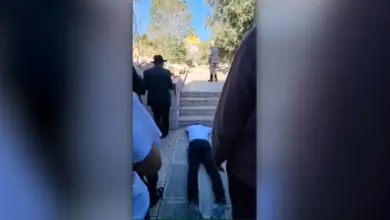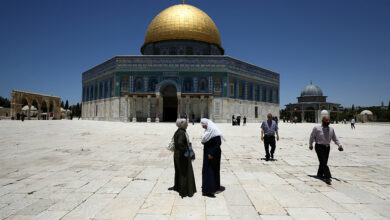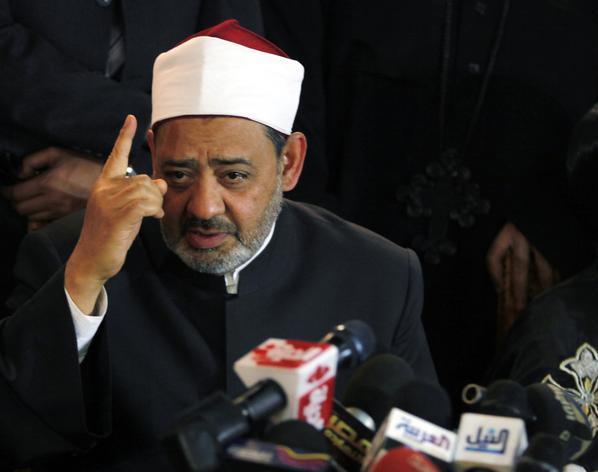Al-Ahram leads with the headline “Peace returns to Jerusalem following Egyptian intervention.” In the corresponding story, the paper credits Egyptian Foreign Minister Ahmed Abul Gheit’s telephone conversation with Israeli Prime Minister Benjamin Netanyahu with putting a stop to Israeli settlers allegedly encroaching on the outskirts of Al-Aqsa mosque in Jerusalem.
Al-Ahram reports that “national Palestinian forces witnessed the Egyptian intervention, which immediately resolved the state of conflict.” Israeli defense forces took over the mosque yesterday, surrounding the “tens of worshippers” in the midst of a two-day sit-in that aimed to prevent “Jewish extremists” from “breaching” the revered site for the sake of celebrating the Jewish holiday Purim, the paper reports. Israeli forces also reportedly blocked all entrances to the holy area, prohibiting any Palestinians younger than 50 from entering. Al-Ahram reports on the ensuing violence, which saw a number of minor confrontations between Israeli forces and Palestinians, during which at least 18 Palestinians were injured by rubber bullets fired by the Israeli police.
Al-Ahram also reports on Egyptian Prime Minister Ahmed Nazif’s declaration, “Egypt has successfully surpassed the repercussions of the global financial crisis,” a statement he went on to claim was supported by various international economic institutions. The statement came during the annual American Chamber of Commerce meeting in Cairo yesterday. Nazif added that “Egypt is one of the few nations to have achieved significant yearly growth, maintaining a growth of five percent despite the financial crisis.” The Prime Minister attributed this growth to governmental reforms since 2004.
Nazif also makes headlines in Al-Akhbar, with the paper’s lead story revolving around the prime minister’s plan for a series of initiatives that he says will benefit low-income families. The plan comes as part of the government’s social reformation program, which is supposed to provide low-income families living in informal settlements with benefits such as health insurance and social insurance. Al-Akhbar reports that these governmental projects will “rely on foreign, and especially American, proficiency.” Nazif’s statements came during the aforementioned American Chamber of Commerce meeting.
Independent and opposition papers are concerned with a different set of issues today. Al-Wafd leads with the headline, “The government refuses to indict ministers!” According to the paper, Deputy Chief Justice of the Supreme Constitutional Court Omar el-Sherif, speaking to a “suggestions and complaints committee” within parliament, affirmed the legality of trying ministers in accordance with common criminal procedure laws, explaining that ministers “are no different from normal people when it comes to addressing charges raised against them by members of parliament or even regular citizens.”
El-Sherif’s comments came as a response to growing demands for the creation of a new law which would deal specifically with accused ministers, a law which el-Sherif says would be unnecessary, despite the fact that the current law was created about 50 years ago, “in the days of the Egyptian-Syrian union.” Defending his position, el-Sherif stated that the creation of new criminal law designed for ministers would be a direct violation of Article 40 of the Constitution, which demands equality among all Egyptian citizens.
Al-Wafd also reports that 103 homes in Mansheyit Nasser were demolished by security forces. According to the paper, residents of the Shohba area in Duweiqa woke up yesterday morning to a “large number” of security forces equipped with bulldozers, in a demolition campaign led by Major General Mokhtar el-Hamalawy and Mostafa Ebada, the head of the Mansheyit Nasser municipality. According to the paper, residents of the area asked authorities to spare their homes. Al-Wafd’s report does not include the authorities’ response to the plea—if any—nor does it give a reason for the surprise demolition.
Meanwhile, former director of the International Atomic Energy Agency and potential presidential candidate Mohamed ElBaradei continues to make news. ElBaradei is featured on the front pages of both Al-Shorouq and Al-Dostour, where he has appeared continuously for over a week now. Al-Shorouq claims to have obtained a document from the foreign ministry demanding that all Egyptian consulates and diplomats abroad refrain from ratifying petitions in support of ElBaradei, as doing so would be a violation of both the law and the Constitution.
Al-Dostour focuses on the international media’s coverage of ElBaradei, including a claim made by “American newspapers” that ElBaradei would win in an election against President Hosni Mubarak if it were held today. British media also held favorable views of ElBaradei, according to Al-Dostour, applauding him for “exposing the Egyptian ruling system locally and internationally for their resistance to independent candidates.” The paper also reports that the ElBaradei Movement for Change is preparing its first official statement, which will be released shortly, according to Al-Dostour, despite the fact that the potential candidate has prior commitments that will see him leave Egypt during the next few days and not return before the end of March.
Egypt’s newspapers:
Al-Ahram: Daily, state-run, largest distribution in Egypt
Al-Akhbar: Daily, state-run, second to Al-Ahram in institutional size
Al-Gomhorriya: Daily, state-run
Rose el-Youssef: Daily, state-run, close to the National Democratic Party’s Policies Secretariat
Al-Dostour: Daily, privately owned
Al-Shorouq: Daily, privately owned
Al-Wafd: Daily, published by the liberal Wafd Party
Al-Arabi: Weekly, published by the Arab Nasserist party
Youm7: Weekly, privately owned
Sawt el-Umma: Weekly, privately owned




